|
De Amerikaanse schrijfster Jhumpa Lahiri Vourvoulias werd geboren op 11 juli 1967 in Londen. Zie ook alle tags voor Jhumpa Lahiri op dit blog.
Uit:Interpreter of Maladies
“The notice informed them that it was a temporary matter: for five days their electricity would be cut off for one hour, beginning at eight P.M. A line had gone down in the last snowstorm, and the repairmen were going to take advantage of the milder evenings to set it right. The work would affect only the houses on the quiet tree-lined street, within walking distance of a row of brick-faced stores and a trolley stop, where Shoba and Shukumar had lived for three years.
"It's good of them to warn us," Shoba conceded after reading the notice aloud, more for her own benefit than Shukumar's. She let the strap of her leather satchel, plump with files, slip from her shoulders, and left it in the hallway as she walked into the kitchen. She wore a navy blue poplin raincoat over gray sweatpants and white sneakers, looking, at thirty-three, like the type of woman she'd once claimed she would never resemble.
She'd come from the gym. Her cranberry lipstick was visible only on the outer reaches of her mouth, and her eyeliner had left charcoal patches beneath her lower lashes. She used to look this way sometimes, Shukumar thought, on mornings after a party or a night at a bar, when she'd been too lazy to wash her face, too eager to collapse into his arms. She dropped a sheaf of mail on the table without a glance. Her eyes were still fixed on the notice in her other hand. "But they should do this sort of thing during the day."
"When I'm here, you mean," Shukumar said. He put a glass lid on a pot of lamb, adjusting it so only the slightest bit of steam could escape. Since January he'd been working at home, trying to complete the final chapters of his dissertation on agrarian revolts in India. "When do the repairs start?"
"It says March nineteenth. Is today the nineteenth?" Shoba walked over to the framed corkboard that hung on the wall by the fridge, bare except for a calendar of William Morris wallpaper patterns. She looked at it as if for the first time, studying the wallpaper pattern carefully on the top half before allowing her eyes to fall to the numbered grid on the bottom. A friend had sent the calendar in the mail as a Christmas gift, even though Shoba and Shukumar hadn't celebrated Christmas that year.
"Today then," Shoba announced. "You have a dentist appointment next Friday, by the way."
He ran his tongue over the tops of his teeth; he'd forgotten to brush them that morning. It wasn't the first time. He hadn't left the house at all that day, or the day before. The more Shoba stayed out, the more she began putting in extra hours at work and taking on additional projects, the more he wanted to stay in, not even leaving to get the mail, or to buy fruit or wine at the stores by the trolley stop.”
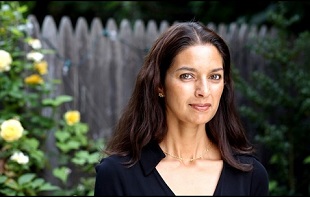
Jhumpa Lahiri (Londen, 11 juli 1967)
De Nederlandse schrijfster en coumniste Marjan Berk werd geboren op 11 juli 1932 in Zeist als Marie-Janne van Baaren. Zie ook alle tags voor Marjan Berk op dit blog.
Uit: Flip
“Het had al weken niet geregend.
Tjibbe woelde met zijn rechterhand door de gortdroge potgrond. Gortdroog.
Hij stond gebogen op het kleine balkon van zijn flat op het zuiden. Niks wilde hier groeien. Alles ging dood in de schrale wind of de brandende zon. ‘Misschien een cactus,’ mompelde hij binnensmonds, ‘misschien dat zo’n taaie plant het hier zou redden.’
Om zijn ogen te beschermen tegen het daverend geweld van de zon had hij zijn bril met zonnekleppen opgezet. Het kon hem werkelijk geen barst schelen dat de meisjes achter de kassa van de supermarkt proestten wanneer hij bij het afrekenen die kleppen rechtovereind zette.
Honderdtwintig kilometer naar het noordoosten keek Duifje naar de dikke zwarte spin, die in de hoek bij de keukendeur onbeweeglijk wachtte op het mannetje dat haar zou bevruchten. Duifje dacht aan haar dochter, die twee weken geleden helemaal uit de Randstad was gekomen om zo’n vette spin met zachte hand, een glas en een ansichtkaart op te pakken en haar ver weg in de tuin te zetten.
Zou dit dezelfde spin zijn? Ze had gehoord dat spinnen, hoe ver je ze ook de tuin in bracht, altijd weer terugkwamen. Duifje rilde. De klok sloeg vier. Ze liep naar het aanrecht om theewater op te zetten, op haar tenen, om de spin niet te verjagen. Dan zou hij weglopen en kon ze hem niet meer in de gaten houden. Waarom woonde haar dochter de dierenvriendin in godsnaam niet gewoon in het huis naast haar? En waarom was er nooit meer een grote degelijke man bij haar komen wonen, die alle spinnen voor haar in de tuin zou zetten, hup, een glas erover, een harde ansichtkaart eronder, zij zou dan de keukendeur voor hem openen en hij zou de spin heel ver achter in de tuin in de heg zetten.”
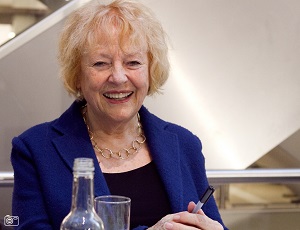
Marjan Berk (Zeist, 11 juli 1932)
De Taiwanees-Amerikaanse schrijver Pai Hsien-yung werd geboren op 11 juli 1937 in Guilin, Guangxi in China. Zie ook alle tags voor Pai Hsien-yung oo dit blog.
Uit: Winter Nights (Vertaald door John Kwan-Terry en Stephen Lacey)
"The alleys in Taipei are like a labyrinth." Wu Chu-kuo smiled. "Even more confusing than the hu-tung of Peiping." His hair was dripping wet and tiny drops of water had formed a film on his silver spectacles. He took off his overcoat, shook it a few times, and handed it to Professor Yii. He was wearing under the overcoat a jacket of padded silk. As he was sitting down, he pulled out his handkerchief and gave his head and face a brisk rub. When he was finished, his silvery-white hair was all fluffed and dishevelled. "I've been wanting to bring you here myself." Professor Yii took out the thermo-glass which was reserved for his own use, brewed some Dragon Well tea in it, and placed the glass before Wu Chu-kuo; he still remembered that Wu Chu-kuo did not drink black tea. "But knowing how busy you must be these few days, I thought I wouldn't go and jostle with the crowd." "We Chinese do have a weakness for lavish entertainment, don't we?" Wu Chu-kuo shook his head gently and smiled. "I've been attending banquets every day for the last few days, and each time it was twelve courses, fifteen courses . . ." "At this rate, if you stay on longer, you'll eat your way back to your old stomach trouble," Professor Yu said, smiling. He sat down opposite Wu Chu-kuo. "I'll say. It's already been too much for my stomach. Shao Tzu-ch'i gave a dinner tonight and I just couldn't eat anything at all . . . He told me it's been several years since you last saw each other. The two of you . . ." Wu Chu-kuo fixed his gaze on Yii Chin-lei, who, passing a hand over his smooth, bald head, heaved a quiet sigh and smiled, "He is a government official now and a busy man. Even if we were to see each other, we wouldn't find anything to talk about. Besides, I'm not good at idle talk, least of all with him. So it might be just as well that we don't run into each other. You remember, don't you, the year all of us joined the Society for the Common Cause? What was the first oath we all took?" Wu Chu-kuo smiled, "Not to join the Government for twenty years." And to think that it was Shao Tzu-ch'i who led the oath-taking that day! Oh, of course, of course, the twenty years have long ex-pired." Professor YU and Wu Chu-kuo both laughed at the same time. Wu Chu-kuo held the cup of green tea in both hands, gently blew aside the tea-leaves swimming on the surface, and took a sip. The tea was hot and the vapor fogged up his spectacles. He took them off and, while cleaning them, squinted as if he were try-ing to concentrate, then sighed deeply. "Yes. Now I have conic back and most of our old friends in the Society have passed away.
"Chia I-sheng died last month," Professor Yu replied. "It was tragic the way he died." "I read about it in the papers abroad. They didn't report it in de-tail though." "Very tragic . . ." Professor Yu murmured. "I saw him on campus the day before he died.”
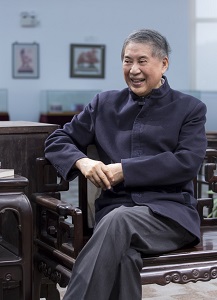
Pai Hsien-yung (Guilin, 11 juli 1937)
De Nederlandse schrijver Herman de Man (eig. Salomon Herman (Sal) Hamburger) werd geboren in Woerden op 11 juli 1898. Zie ook alle tags voor Herman de Man op dit blog.
Uit: Het wassende water
“Ook zag vrouw Beijen van haar rieten zorg op 't deelplankier gestadig over het land uit. Hun hofsteê was er een van den ouden stempel, want toen Water-Snoodt gebouwd wier, bestond in de buurten de trek naar de stad nog niet. Hetgeen toenmaals aan den dijk roerde en voorttrok, kon een echten werkboer tòch ommers niet aanbelangen. Daarom wieren in dien ouwen tijd al die huizingen in 't midden van het land gezet, en verbonden met een lange boomlooze sticht naar den dijk, om toepad voor gerij te bekomen. Dat gaf een durend overzicht op het werkvolk en 't hieuw de stadsche kuren verre. Bedelaars en kramers kwamen maar schaars de lange hoevesticht afgeloopen, dat was altemet een groote gerustigheid, want veul kwaad volk schuilt onder deze gasten. Meermaals heeft ievers op een volgetaste schuur de roode haan gekraaid, als weeral een vreemde bedelaar niet naar zijn believen ontvangen en was. En jonkvolk mocht over de achterafsche eenigheid op zoo een midlandshoef klagen, dat was altijd maar in de eerste uitvliegjaren. Later, een heel vruchtbaar leven lang nog, hadden ze vrede in deze eenigheid, beliefden zij gansch geen drokte of vertier.
Wel was, van hofsteê naar hofsteê, over de kabbelslooten, een plank gelegd; dat hieuw de goede buurschap aan met de naaste bewoners, die van eigens ook niet bar veel zagen geschieden zoo te midden van het grasland. Maar wijders kwam alle vertier toch van buiten af, meest uit de stad. De kooplui kwamen en gongen. Ze brochten meel en koeken voor de pinken; zemelen en pulp als winterbijvoer; kruidenierswaren, gereedschap en tuigerij; ze droegen flesschen stremsel aan, wagenolie, goed en kleêr; soms reed een keuensnijer achterom, een kaaskooper, de Notaris die jagen kwam, veekooplui en koeidrijvers, stadsche meneeren van de verzekering, maar in die jaren nooit of ooit de Dominee. Wèl voormaals diens voorganger, de ouwe Dominee Remmerswaal, die veel particulierder met de rechtgeäarde boeren was geweest.
Maar achter die stille, schier ingeslapen eenderheid op al deze boerendoeningen, woelden krachtig en soms ontzaglijk de groote belangen, meest diep in het verborgene, gelijk een felle onderstroom van water onder 't bevrozen dek eener rivier. Daar wier niets van gezien of gemorken door de lachgrage kooplui, die met hun waar, of om koeien te koopen, achterom fietsten, en er wier niet over gepraat door de geburen onderling, want een elk koesterde zijn begeerten in 't verdokene. Dat waren begeerten zonder tong. Ze dreven àl die levens, ze kwamen als weerglans op àl die zwijgwezens, afleesbaar voor de ingewijden... maar nimmer traden ze aan den dag, die begeerten.”
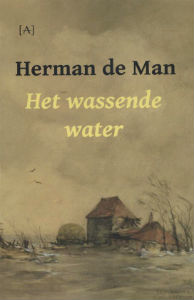
Herman de Man (11 juli 1898 – 14 november 1946)
Cover
De Duitse dichter en schrijver Helmut Krausser werd geboren op 11 juli 1964 in Esslingen am Neckar. Zie ook alle tags voor Helmut Kraussner op dit blog.
Uit: Alles ist gut
“Jerzy, der polnische Hausmeister in unsrem Block, ist einundachtzig Jahre alt.
Ein Hutzelhomunkel, nicht eben zwangsjackenhacke, doch eigenstartig bis skurrilst. Jedes Weibswesen, welchen Alters einerlei, spricht er mit »Gneidiges Froilein, wie scheen Sie sein!« an und bezirzt/beschleimt es, als stünde sein Mittelleib noch in vollem Saft und Wuchs. Manchmal holt er aus der Hose etwas hervor, das, denn Jerzy weiß um präzise Grenzen, in seiner Faust versteckt bleibt. Es ist mehr als Witz gemeint denn als Bedrohung oder Angebot. Wenn er über den Hof schlurft und seine fleckigen Hände zittern, könnte man Mitleid bekommen – oder in Verstimmtheit geraten über die hier deplazierte Lethargie des Todes, die einen wie ihn nicht erlösen will. Indes – der Flinkflug seiner Zunge erstaunt, er zäumt sie auf ihren verwegenen Ausritten mit Komplimenten und erotischen Avancen, die an sich peinlich wirken mögen. Von einem reiferen, gnädigeren Standpunkt aus betrachtet, der die Welt und ihre Insassen gründlicher kennengelernt hat und um die Vergänglichkeit allen eitlen Treibens weiß, kann man ihm etwas Drolliges abgewinnen. Und wie als überraschende Pointe, die einen schlechten Witz in eine formidable Anekdote verwandelt, führte er dem Block eines Tages seine Freundin vor. Sie sah ungefähr zwanzig Jahre jünger aus als er, war blond, leicht fettig, in einem preußischblauen Jogginganzug, doch insgesamt – für seine Verhältnisse – durchaus vorzeigbar. Sie küßten einander im Hinterhof, sie schmusten unter der Kastanie. Daß Jerzy dabei jodelte und seltsam eselshafte Brunftlaute ausstieß, solch maskulines Overstatement verwässerte ein wenig seinen Triumph, der still genossen um einiges mehr beeindruckt hätte. Vorgestern dann wurde Jerzy angezeigt, von einer jungen neuseeländischen Touristin, die im Hinterhaus, erster Aufgang zweiter Stock, eine Wohnung (eine heimlich betriebene, nicht als solche deklarierte Ferienwohnung) gemietet hat.“
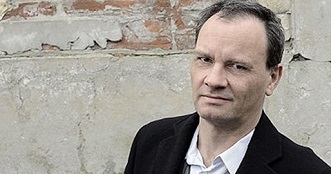
Helmut Krausser (Esslingen am Neckar, 11 juli 1964)
De Engelse schrijfster Jane Mary Gardam werd als Jane Pearson geboren op 11 juli 1928 in Coatham, North Yorkshire. Zie ook alle tags voor Jane Gardam op dit blog.
Uit:The Flight of the Maidens
“Pedalling alone towards home, Hetty stopped beside the post office litter-bin, which was almost empty, litter being in short supply. The letter to Eustace, sealed and stamped among the empty Gold Flake cigarette packets, looked conspicuous. So she sighed, and took it out.
Hetty knew that this was the moment to abandon Eustace. If it was a novel, she thought, this is the perfectly appropriate, most natural development. At this point the heroine should have the courage to leave her grateful little-girl self behind and start again towards maturity. What’s more, she thought, to hell with novels, it was guilt about her false position with Eustace that was flooding and spoiling these days of glory.
But if this were a novel, she thought, it would be hard not to end it with Eustace. Everything about her meeting him had been so right, so perfectly timed. She had at 17 loved a man—a man of nearly 22—who had loved her, and was right for her in every way.
And tall.
And except for the Adam’s apple he looked great. Such lovely hands, although they did hang down, a bit like seal’s flippers. And his nails were always so clean. And he sang so beautifully and his poetry was almost exactly like Walter de la Mare’s. And he had been so pleased when she’d agreed that he was like Sassoon, and often asked her if she still thought so, and she had always said yes; though somehow you couldn’t see Eustace tally-hoing on a horse. Or in the trenches, at ease with his men. And loving them. Deeply, deeply.
And Eustace thought she was wonderful. He had said so, which nobody else had ever done and maybe never would. There’d been plenty of kissing in Hetty’s life, at church socials and with soldiers in back streets after Saturday-night hops which her parents knew nothing about: but nobody had ever said anything. Just mauled and gobbled.
But there had been one moonlit night when she was 15 on the way home from a Bible meeting (Hosea) and in the local park, with the railings all gone to make Spitfires. She had been in the rose garden with a devout sort of boy from Corporation Road, and they had kissed and kissed to the accompaniment of the Messerschmitts rumbling overhead in the dark towards Tyneside. The park had stood open ever since 1941 when the firemen had not been able to get in to deal with an unexploded bomb that had landed in the bowling green and turned it to a pond. By 1943 every member of the Bible class came home along the park and melted into the bushes, except for Hetty, who wouldn’t go beyond the more conspicuous park benches. Other, notoriously sexy, Bible students had like nesting birds made the bushes heave and chirrup.”
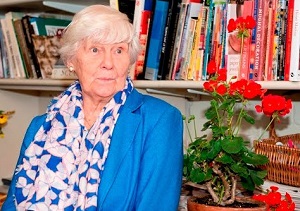
Jane Gardam (Coatham, 11 juli 1928)
De Franse schrijver Henri Coulonges werd geboren op 11 juli 1936 in Deauville. Zie ook alle tags voor Hneri Coulonges op dit blog.
Uit:La Lettre à Kirilenko
“Il s'arrêta et s'appuya quelques instants sur le parapet du quai. La luminosité de l'air lui permettait de voir avec précision les deux sphinx accroupis qui encadraient sur l'autre rive l'austère portique de l'Académie. Il se souvenait d'avoir par jeu enfourché l'un d'eux lors de sa brève étape sur la route de Moscou. C'était Aubertin qui l'accom-pagnait. Tous deux avaient encore dans l'oreille les cris défaitistes des paysans aux abords des gares et les commentaires indignés des officiers de la Mission française de-vant ce pacifisme intolérable. C'était quand ? Octobre 1916 ? Quatre ans et quatre mois déjà... Le visage de son jeune camarade de promotion se superposa un instant à la glace plombée de la Néva. « Demande donc au sphinx ce qui nous attend », avait lancé Auber-tin de son intonation chantante. Ce qui les attendait... Il serra son bonnet de fourrure contre ses oreilles. Où retentissait-elle désormais, la voix ensoleillée de son camarade d'alors ? Dans quel climat parcouru d'alizés et d'odeurs de garrigue ? Il n'avait plus ja-mais eu de nouvelles de lui. Le froid du granit transperça ses gants à tel point qu'il abandonna sa position de vigie solitaire et, remontant d'un geste vif le col de sa capote, se dirigea vers l'ancien Sénat. Des traînées de gel parcouraient le vaste espace de l'esplanade et se rejoignaient plus loin sous la façade de l'Amirauté, enchâssant le massif bâtiment dans un écrin de glace miroitante et moirée. Du côté opposé à celui où il se trouvait, une horde de chiens er-rants entourait comme une garde exténuée un grand lévrier blanc qui vacillait de fai-blesse. De quel palais, se demanda-t-il, de quel endroit privilégié avait-il été chassé par la famine, condamné à errer dans les rues désertes comme un animal de légende déjà marqué par la mort... « C'te canaille rouge, entendit-il soudain crier une voix éraillée. C'te canaille rouge, j'vais te dire c'qu'elle amène avec elle : l'Antéchrist ! T'entends ? L'Antéchrist... » Cela venait de l'arche reliant le Sénat au Synode — les noms des édifices lui remon-taient à la mémoire à mesure qu'il se rappelait la visite des monuments de la ville qu'on leur avait imposée en dépit de leur fatigue. « L'Antéchrist ! reprit la voix. L'Antéchrist qu'ils ont amené avec eux ! Un prince qu'a grand empire... » Curieux, il s'approcha. Accroupie sur un tas de haillons, le dos contre la voûte, tenant une branche de sapin à la main comme un sceptre dérisoire, une femme sans âge mar-mottait des paroles indistinctes en une mélopée à la fois rageuse et geignarde. Dès qu'elle l'aperçut elle se mit brusquement en fureur, fouailla l'air de sa branche, puis chercha de ses bras squelettiques à lui agripper les bottes. Il fit un bond en arrière et s'éloigna précipitamment, poursuivi par les imprécations qui retentissaient dans l'air gla-cé sans que leur intensité décrût. Dans son trouble il faillit heurter un groupe de pay-sannes engoncées dans des capes informes qui, courbées sous des ballots, progressaient péniblement vers la cathédrale au milieu des fondrières et des immondices à demi recou-vertes de neige. Le petit groupe paraissait avoir erré si longtemps par les forêts et les vil-lages qu'il ressemblait à la horde de chiens faméliques qui longeait les murs de l'Ami-rauté. « L'Antéchrist avec la canaille rouge, continuait derrière lui à glapir la mendiante, t'entends, l'Antéchrist... » Parvenu au coin du boulevard, il se retourna.”
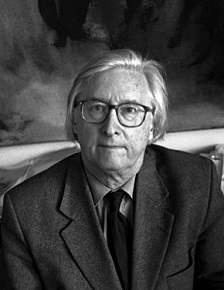
Henri Coulonges (Deauville, 11 juli 1936)
De Amerikaanse schrijver publicist, essayist Elwyn Brooks (E.B.) White werd op 11 juli 1899 geboren in Mount Vernon, New York. Zie ook alle tags voor E. B. White op dit blog.
Uit: Here is New York
“On any person who desires such queer prizes, New York will bestow the gift of loneliness and the gift of privacy. It is this largess that accounts for the presence within the city's walls of a considerable section of the population; for the residents of Manhattan are to a large extent strangers who have pulled up stakes somewhere and come to town, seeking sanctuary or fulfillment or some greater or lesser grail. The capacity to make such dubious gifts is a mysterious quality of New York. It can destroy an individual, or it can fulfill him, depending a good deal on luck. No one should come to New York to live unless he is willing to be lucky.
New York is the concentrate of art and commerce and sport and religion and entertainment and finance, bringing to a single compact arena the gladiator, the evangelist, the promoter, the actor, the trader and the merchant. It carries on its lapel the unexpungeable odor of the long past, so that no matter where you sit in New York you feel the vibrations of great times and tall deeds, of queer people and events and undertakings. I am sitting at the moment in a stifling hotel room in 90-degree heat, halfway down an air shaft, in midtown. No air moves in or out of the room, yet I am curiously affected by emanations from the immediate surroundings. I am twenty-two blocks from where Rudolph Valentino lay in state, eight blocks from where Nathan Hale was executed, five blocks from the publisher's office where Ernest Hemingway hit Max Eastman on the nose, four miles from where Walt Whitman sat sweating out editorials for the Brooklyn Eagle, thirty-four blocks from the street Willa Cather lived in when she came to New York to write books about Nebraska, one block from where Marceline used to clown on the boards of the Hippodrome, thirty-six blocks from the spot where the historian Joe Gould kicked a radio to pieces in full view of the public, thirteen blocks from where Harry Thaw shot Stanford White, five blocks from where I used to usher at the Metropolitan Opera and only a hundred and twelve blocks from the spot where Clarence Day the Elder was washed of his sins in the Church of the Epiphany (I could continue this list indefinitely); and for that matter I am probably occupying the very room that any number of exalted and some wise memorable characters sat in, some of them on hot, breathless afternoons, lonely and private and full of their own sense of emanations from without. . . . New York blends the gift of privacy with the excitement of participation and better than most dense communities it succeeds in insulating the individual (if he wants it, and almost everybody wants or needs it) against all enormous and violent and wonderful events that are taking place every minute.”
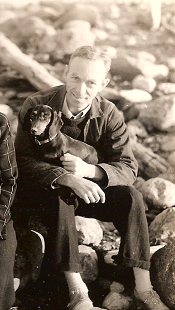
E.B. White (11 juli 1899 – 1 oktober 1985)
Cover
Onafhankelijk van geboortedata
De Vlaamse schrijfster Ann De Craemer werd geboren in Tielt in 1981. Zie ook alle tags voor Ann De Craemer op dit blog.
Uit: Vurige tong
“Ze sloeg voorzichtig haar bijbel dicht, en terwijl haar ogen zich vasthaakten aan haar schoenen ging ze weer op haar stoel zitten.
Het moment was nu aangebroken. Zuster Francis stond op. Ze liep naar het grote houten kruisbeeld met de koperen Jezus, dat vooraan was neergelegd tegen een plank waarover een paarsfluwelen doek was gespannen. Ze deed voor wat wij straks een voor een zouden moeten nadoen. Ze vouwde de handen in elkaar, terwijl haar blik tegelijk op oneindig en op de koperen Jezus was gericht. Eerst raakte haar rechterknie de grond, daarna de linkerknie. Ze boog langzaam voorover, de handen nog steeds in elkaar gevouwen. Dat maakte het moeilijk om haar evenwicht te bewaren, waardoor haar welgevormde achterwerk hing te wiebelen in de lucht. Ze boog haar bovenlichaam naar voren en kuste met gesloten ogen de voeten van Jezus. Langzaam ging ze weer rechtop staan — linkerknie los van de grond, daarna de rechterknie. Ze draaide zich om, opende langzaam de ogen en gebaarde dat we haar voorbeeld moesten volgen.
Ik had vroeger naar dit moment uitgekeken, omdat het zo buitengewoon afwijkend was van wat ik dagelijks beleefde, maar nu sputterde mijn hele lichaam tegen. Waarom moest ik de voeten van een beeld kussen? Wat voor vieze daad van onderwerping was dit? Leerlinge na leerlinge kuste het kruis zonder dat het één keer werd schoongemaakt Allah is licht boven licht, zegt de Koran. Jezus was die dag, voor de zesde keer op rij, mond boven mond, speeksel boven speeksel, bacterie boven bacterie. Onze voeten bleven schuifelen en zuster Francis keek nauwgezet toe of alles goed verliep.”
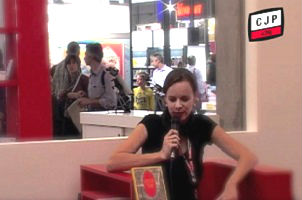
Ann De Craemer (Tielt, 1981)
Zie voor nog meer schrijvers van de 11e juli ook mijn blog van 11 juli 2016 en ook mijn blog van 11 juli 2015 deel 1 en ook deel 2.
11-07-2019 om 18:39
geschreven door Romenu 
Tags:Jhumpa Lahiri, Marjan Berk, Pai Hsien-yung, Herman de Man, Helmut Krausser, Jane Gardam, Henri Coulonges, E.B. White, Ann De Craemer, Romenu
|

